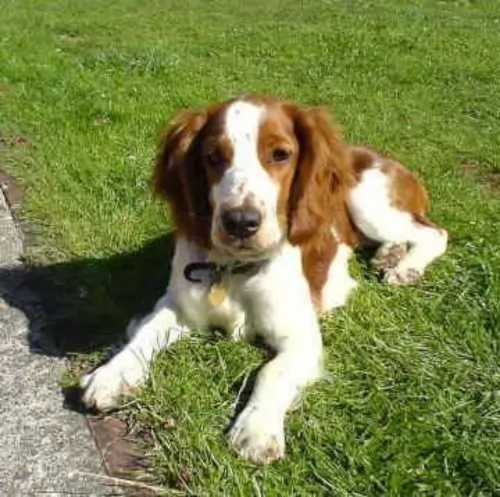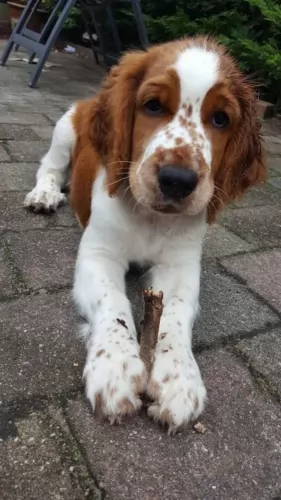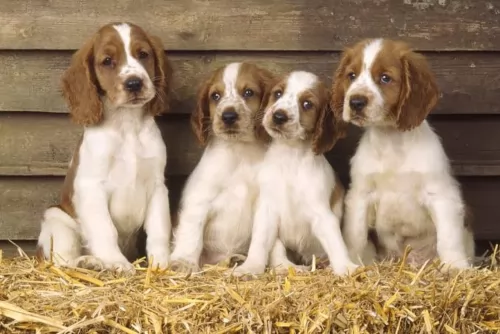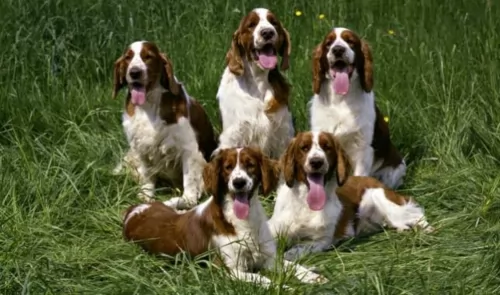 Petzlover
PetzloverBoth Black and Tan Terrier and Welsh Springer Spaniel are originated from United Kingdom. Black and Tan Terrier may grow 10 cm / 3 inches shorter than Welsh Springer Spaniel. Black and Tan Terrier may weigh 9 kg / 19 pounds lesser than Welsh Springer Spaniel. Both Black and Tan Terrier and Welsh Springer Spaniel has almost same life span. Both Black and Tan Terrier and Welsh Springer Spaniel has almost same litter size. Both Black and Tan Terrier and Welsh Springer Spaniel requires Moderate Maintenance.
There is limited information on the Black and Tan Terriers since it is extinct. Black and Tan terrier came out of the “Terrier Wars” between the British and the Welsh in the late 1800’s. With dog shows on the rise, a race began to develop terriers that “belonged” to the Welsh or the British. The Black and Tan Terrier started out as the “Old English Broken-Haired Black and Tan”. The outrages Welsh responded with their first dog show filled with Welsh only terriers. There were 90 dogs at this first show. During this time, the British could not get their act together in respect to starting a club. Even agreeing on the name was difficult for them. Unfortunately, the dogs from both countries were not truly a “breed” but rather first-generation crosses between a wide variety of terriers. These terriers included breeds such as the Lakeland Terrier, the Welsh Terrier, the Patterdale Terrier, Fell Terriers, Border Terrier, Scottish Borders and the Manchester Terrier. The winner of that first dog show was a terrier cross between a Smooth Fox Terrier and a Border Terrier.
In 1885 both the Welsh and the British Black and Tan Terrier were featured. However, the English could not get the club together, so they were dropped from the Kennel Club Listings and only the Welsh Terrier was offered. The Black and Tan Terrier became extinct before 1900.
 The Welsh Springer Spaniel is thought to be an old Land Spaniel similar to the English Springer Spaniel. They were pretty mush an unknown breed until they won a string of dog trials and became more popular. Following this surge the breed was recognized by the UKC in 1902 and were named the Welsh Springer Spaniel. No one really knows when the breed was developed and cannot be traced because of lack of documentation. They were brought to America in the early 1900’s and were recognized as a breed by the AKC (American Kennel Club) in 1906.
The Welsh Springer Spaniel is thought to be an old Land Spaniel similar to the English Springer Spaniel. They were pretty mush an unknown breed until they won a string of dog trials and became more popular. Following this surge the breed was recognized by the UKC in 1902 and were named the Welsh Springer Spaniel. No one really knows when the breed was developed and cannot be traced because of lack of documentation. They were brought to America in the early 1900’s and were recognized as a breed by the AKC (American Kennel Club) in 1906.
There are images of a dog looking a lot like the Welsh Springer Spaniel in old prints and pictures. The pictures are of a dog known as a Land Spaniel very much like the Welsh Springer Spaniel. These dogs were thought to be preserved by the Welsh and originally called the Welsh Starter. It was a hunting breed working with falcons.
At one point the breed was called the Welsh Spaniel and was also in the UK studbook as a Cocker Spaniel or a Welsh Cocker. There were several different types of Cocker Spaniels including the English Cocker, the Welsh Cocker, the Devonshire Cocker. The Welsh Cocker Spaniel was a solid dark color while the Welsh and Devonshire Cockers were liver colored.
Following World War II there were no dogs left in Wales or anywhere else in the United Kingdom whose parents were registered pedigree. The unregistered dogs were used to restart the breed and these dogs are the ancestors of the modern Welsh Springer Spaniel.
The breed is still rare with only 299 registered in the UK in 2016. They are listed now a vulnerable Native Breed.
The Black and Tan Terrier was an active, alert dog. A ratter as most terriers are. With a sleek coat, tan markings and thumbing, he was a handsome dog. Looks very much like the other terriers of his size and color with a truncated tail. He had small erect ears and a snout that was moderately elongated.
 The breed is a medium size, solid and compact dog bred to work. Their forequarters are angled and there hindquarters are well developed. This is a very good looking breed that is only red with white markings. A hard working dog bred to hunt. They are slighter longer than tall and are not penalized as long as the height tis not greater than the length.
The breed is a medium size, solid and compact dog bred to work. Their forequarters are angled and there hindquarters are well developed. This is a very good looking breed that is only red with white markings. A hard working dog bred to hunt. They are slighter longer than tall and are not penalized as long as the height tis not greater than the length.
The tail in docked except in countries where it is illegal to do so. Their eyes should be brown. Noses are black or brown. The ears are small with a fethering like most setters. The show and field styles are the same. They are confused with the Engolish Springer Spaniel even though there are many differences. But both breeds are born to hunt and “spring” at the prey. They are smaller than the English Springer Spaniel and larger than the English Cocker Spaniel.
He was an alert and active dog. He was a good guard dog, an excellent ratter and a great family dog. He was affectionate, warm and gentle of the most alert and active of dogs, as game as a pebble, an ideal watchman, an unexcelled ratter and all done up in a small package. No dog exceeds him in beauty of outline, and this is enhanced by his sleek coat, with its sheen that the costliest satin does not possess; set off by the rich Tan markings, dainty penciling and thumbing that would puzzle an artist to reproduce. Information is limited on this extinct breed.
The Black and Tan Terrier suffered from similar ailments as all terriers. He dealt with patella luxation (kneepads floating), skin allergies and eye issues. Because the breed is extinct there is little if any research on the health issues they might have experience before distinction
 • Eye Diseases – Glaucoma can cause blindness; Entropian – eyelids curl inwards and can damage the cornea.
• Eye Diseases – Glaucoma can cause blindness; Entropian – eyelids curl inwards and can damage the cornea.
As you would with any terrier of his size 1-2 cups day.
The Black and Tan Terrier suffered from similar ailments as all terriers. He dealt with patella luxation (kneepads floating), skin allergies and eye issues.
The Black and Tan Terrier is in fact a terrier. He was a ratter and he needed intelligent exercise to keep him happy and non-destructive. Activities like barn hunt, agility and fly ball are perfect for this breed. A walk a couple times a day with a time for games is what was needed, and he would love to play ball with kids. They were very cuddly dogs as well.
 1Feeding the puppy active puppy. Feed breed specific or medium breed high quality dogfood. Feed ½ -3/4 cup in 2-3 meals
1Feeding the puppy active puppy. Feed breed specific or medium breed high quality dogfood. Feed ½ -3/4 cup in 2-3 meals
2.Feeding the adult active breed. Feed breed specific or medium breed high quality dogfood. Feed 1-1/2 cup in 1-2meals
4. Games and Exercises – Needs a secure fenced yard. Loves sports and outdoor activity. Agility, obedience, rally, tracking and loves to run, bike and hike.